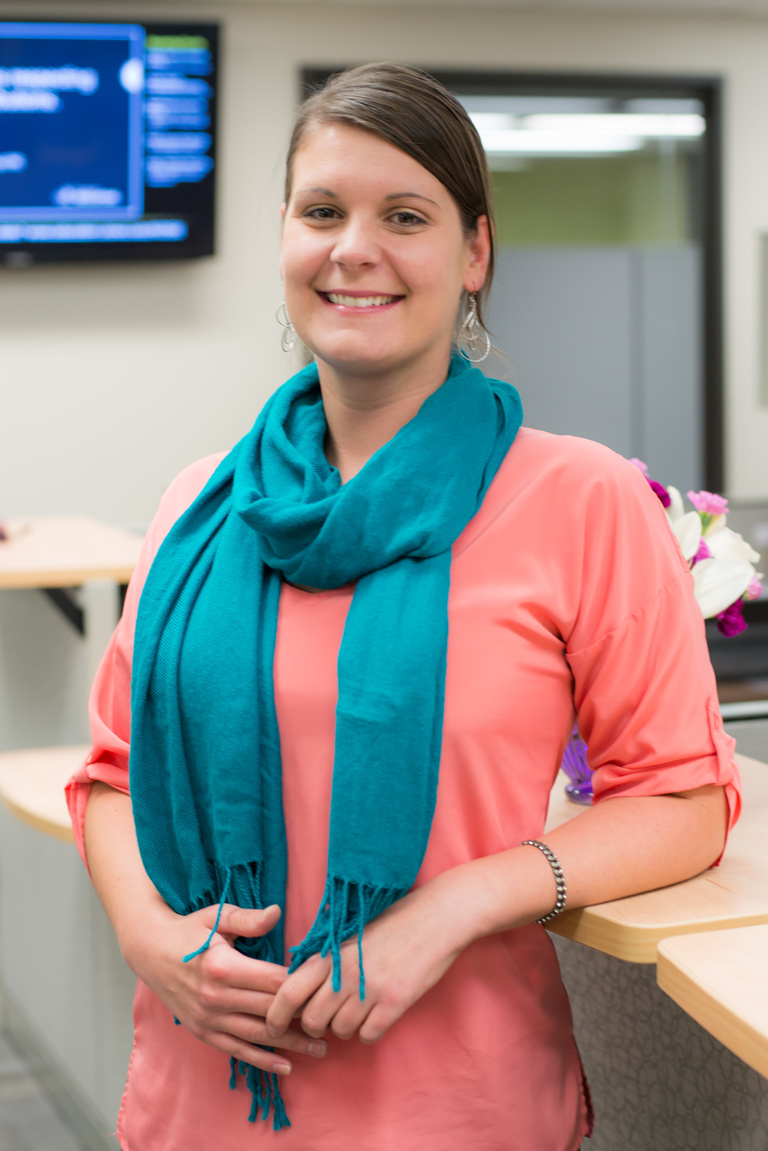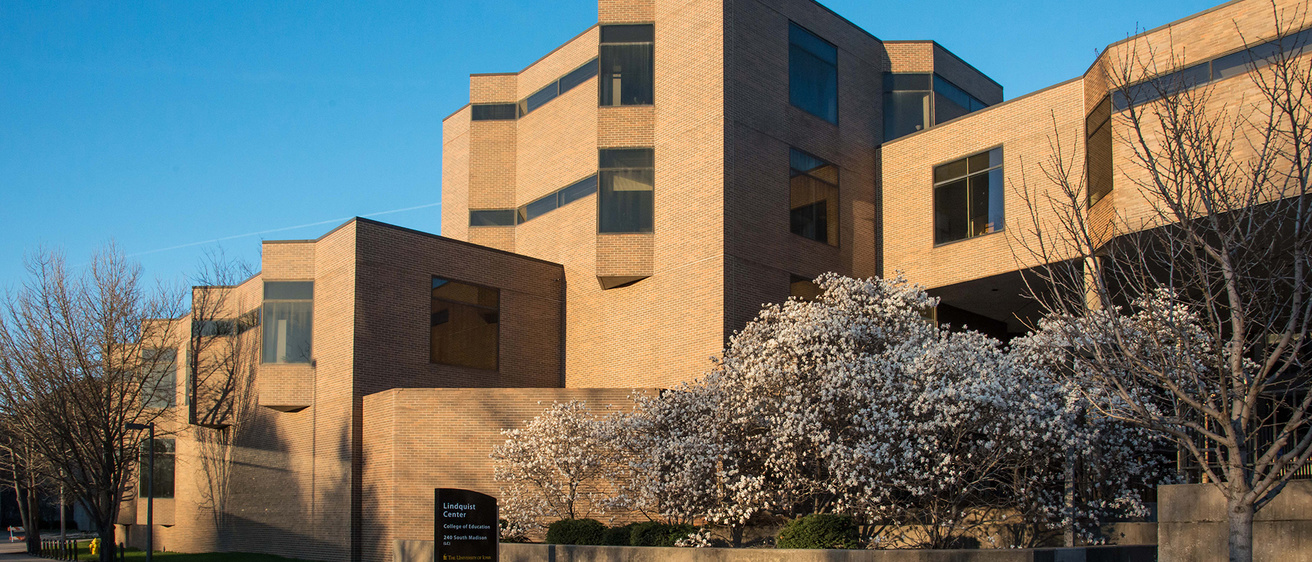By Elianna Novitch
The University of Iowa College of Education recently announced the inaugural awardees of the Department of Teaching and Learning’s Graduate Student Research Awards to honor the impactful research being done by the college’s graduate students.
The two new awards include the Research Achievement Award and the Research Paper Award. The Research Achievement Award recognizes a graduate student for an overall research profile stemming from a body of work as part of a research team as represented by publishable or published papers. The Research Paper Award recognizes a graduate student for their work on a single publication as a first or sole author.
This year’s inaugural recipients include Ashley Rila, from Mount Pleasant, IA, who was awarded the Research Achievement Award, and Kate Lechtenberg, from Des Moines, IA, who was awarded the Research Paper Award.
Rila says receiving the Research Achievement Award was a surprise and honor.
“When a person embarks on a Ph.D. program, one devotes enormous amounts of time and energy to their studies in hopes to make meaningful contributions to their fields,” Rila says. “Often, this dedication goes unnoticed and often requires a student to dig deep into themselves to find motivation to continue their work. Receiving this award was one reminder that I am doing important work and have already made an impact in my field as an early scholar.”
Lechtenberg says she was honored to be awarded the Research Paper Award as well. Four additional students received Honorable Mentions in the Research Paper Award category.
“I'm so honored to have won this award because I know that there are many excellent graduate student researchers and writers in the Department of Teaching and Learning,” Lechtenberg says. “I am graduating this semester, and it was the perfect send-off to keep me going in my future research.”
Research Achievement Award

Rila, who just obtained her Ph.D. in Special Education, was advised by Associate Professor Allison Bruhn. Her dissertation was on high school teachers’ use of praise and reprimands and how that varies by student race and gender.
Rila, a school-based researcher, is interested in positive behavior interventions and supports that promote equitable access to educational systems for all students, especially for students based on race and disability. Her research focuses on reducing disproportionate discipline practices and improving outcomes for all students through the use of evidence-based practices such as Positive Behavior Interventions and Supports (PBIS), praise, Opportunities To Respond (OTRs), and self-monitoring.
“I am so proud of her commitment to tackling the issue of inequitable discipline practices in school, as it is often talked about but rarely addressed in a concrete and productive way, ” Bruhn says in her recommendation letter for Rila. “She is bravely having difficult conversations with teachers so that all students, and particularly students of color, have an opportunity to succeed in class rather than experience disproportionate exclusionary discipline practices.”
Rila has been involved in a variety of different research opportunities including being published in six peer-reviewed publications, with three manuscript submissions currently under review.
She also assisted in conducting a systematic literature review on high school PBIS in which she conducted the literature search, established research questions, coded articles, synthesized data, and wrote parts of the manuscript. Alongside colleagues at Vanderbilt University, Rila was a major contributor to a systematic literature review on self-monitoring interventions for school-aged children.
Other important projects included training teachers, collecting and analyzing data, writing manuscripts in a quantitative study and a mixed methods study on a self-monitoring intervention for students and teacher’s use of data within that self-monitoring intervention.
As a first author, Rila wrote a “research to practice” article focused on how teachers can leverage the use of technology in classrooms to increase opportunities to respond, and in turn, increase student engagement.
“As educators, we must ensure all students have equal access to education. Unfortunately, research indicates that this is not true as, students of color and students with disabilities are disproportionately suspended and placed in special education settings at a high rate,” Rila says. “Given this disproportion, my research areas are immensely important to our society in hopes to find solutions to these dire trends.”
Rila has a postdoctoral research position with Bruhn at University of Iowa next year.
Research Paper Award

Lechtenberg, who just obtained her Ph.D. student in Language, Literacy, and Culture education, was advised by Professor Amanda Thein. Her paper, currently under review, is entitled “Beyond Good Intentions: A Critical Discourse Analysis of Teaching Tolerance’s ‘Teaching The New Jim Crow: A Teacher’s Guide.””
Lechtenberg’s research centers on how educators select texts and frame discussions about sociopolitical issues that are commonly labeled as controversial in secondary schools. In her paper, Lechtenberg analyzes the language and structure in curricular materials for teaching Michelle Alexander's ‘The New Jim Crow’, published by Teaching Tolerance, a leading progressive education organization.
“I found that the scripted instruction, text-centric focus, and implied audience of white teachers and students actually undermined Teaching Tolerance’s stated goal of democratic, anti-racist education,” Lechtenberg says.
Lechtenberg found a misalignment between the stated goal of empowering critical conversations about race and the aspects of the lesson plans’ language and structure that supports a procedural, uncritical approach that centers an implied white audience.
Lechtenberg says her paper is particularly important because often teachers find free materials like Teaching Tolerance's material online or they are given commercially produced instructional scripts that are not tailored to the needs of individual teachers, students, and communities.
“Even well-intentioned curricular scripts can be damaging without appropriate critique and adaptation,” Lechtenberg says.
Lechtenberg’s study carries implications for a range of stakeholders including teachers, teacher educators, and creators of curricular materials who are committed to critical education that goes beyond the transmission of progressive messages and rejects the superficiality of good intentions. Her goal is to pursue research that furthers the work that critical teachers and teacher educators do in pursuit of equitable education.
“I think research into how teachers teach about issues like race and racism is important because simply having goals for equitable, antiracist education is not enough,” Lechtenberg says. “Educators need to self-critical of the extent to which our methods live up to our ideals.”
Lechtenberg has been published in three practitioner journals, three book chapters, and in three manuscripts that are currently in revision with peer-reviewed journals.
“As a former classroom English language arts teacher and school librarian, Kate is committed to scholarship that considers how teachers select and approach instruction on texts that are deemed ‘controversial,’” Thein writes in her recommendation letter for Lechtenberg. “Kate’s manuscript will be important for researchers, teachers, and curriculum writers alike.”
Lechtenberg is currently in the process of making a decision about what her next step will be post-graduation.
